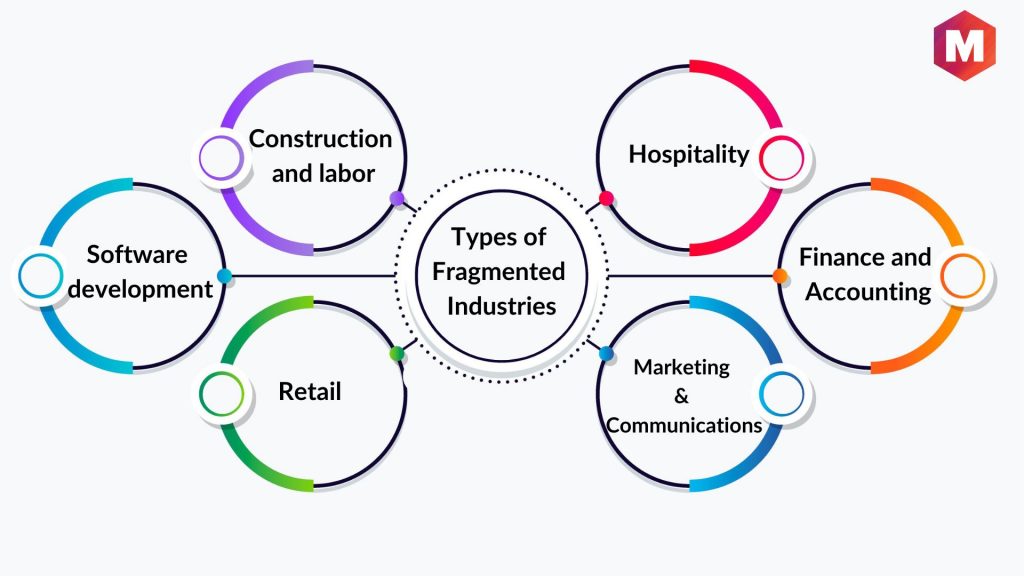A fragmented market is one in which no single entity dominates the industry. It is distinguished by many small and medium-sized firms vying for customers in their specific specialty sectors. Retail is an example of a fragmented market, with numerous small and medium-sized enterprises competing for clients.
Table of Contents
Definition of Fragmented Market
A fragmented market is one where no single company can steer the industry. A fragmented market has multiple small and medium companies competing with each other and with major companies. No single company dominates the market. Most companies require a strong brand identity to stand out from the competition. A fragmented market makes this challenging.
Market fragmentation is based on the premise that each market has diverse customer needs, groups, and marketing responses. These many parts, which are typical of every market, indicate fragmentation.
Take the takeout industry. Indian, Chinese, Mexican, and other takeout businesses compete with each other and with larger restaurants that provide diverse cuisines. Other fragmented markets include clothes merchants, furniture stores, agriculture, plant nurseries and landscaping, book publishing, bulk building supplies, and others.
Fragmented markets are here to stay, so enterprises entering them should understand them.
Key Takeaways
- Fragmented markets are distinguished by the lack of a dominant player, with many small and medium-sized enterprises competing in narrow niches.
- Building a solid brand reputation in such marketplaces is difficult due to high competition and different consumer needs.
- Market fragmentation indicates the diversity of buyer tastes and wants, forming several unique market segments.
- Some examples of fragmented sectors include food takeaway, retail, furniture sales, agriculture, landscaping, book publishing, and building supplies.
How does a fragmented market form?
A fragmented market usually starts when a field grows to meet the needs of more or different customers. The market has no clear winner, so different niches begin to form, each serving a distinct group of customers. This sectored environment makes it easy for smaller businesses to develop new ideas and meet specific needs. Here’s a complete look at how this kind of system comes about:
- Diverse Consumer Preferences: As industries change, they must meet various customer needs. The market can not fully adjust to these new needs without a monopoly. Because of this diversity, the market splits into different parts, which lets small and medium-sized businesses tailor their products to meet the needs of these niche groups.
For example, consider the organic food business, where customers seek gluten-free, vegan, or local choices. Because no one company can meet all food needs, the market comprises companies specializing in different things.
- Balanced Competitive Landscape: When no clear market winner exists, all businesses have the same chances to succeed. When there is equal market impact, companies may decide it is better to lead in smaller groups, taking over these niches and making the market more fragmented overall.
For example, look at the tech industry. There is not just one company that makes smartphones with all the power. Instead, many brands compete for customers’ interest by emphasizing specific factors, such as the camera’s quality or the battery’s length.
- Economical Alternatives: Innovation is not the only thing that changes things. When customers look for cheaper options, the market often breaks up, forcing businesses to rethink their plans. By splitting into smaller groups, they can focus on making alternatives with lower prices without lowering the quality. This will attract customers looking to save money and help further divide the market.
For example, in the fashion industry, people often avoid buying from well-known brands in favor of thrift shops or online boutiques that sell similar items for much less. As a result, some brands may change their strategies to appeal to these price-conscious groups.
Reasons that lead to the formation of a Fragmented Market
Market fragmentation arises for many reasons. Some of the reasons are:
- The various market needs and wants
- Low level of innovation in products
- No economies of scale
- Intense competition in the market
- Customization of the product is high
How to identify a fragmented market
In broad areas such as technology and hospitality, explicit qualities contribute to determining whether a market is fragmented or has the potential to fragment soon. Consider the attributes given below to determine whether a market is fragmented:
1. Evaluating Entry Barriers
A fragmented market is frequently distinguished by its accessibility. Because all businesses in such a market compete well, there are usually no significant barriers to new entrants. However, in a fragmented market, these are frequently limited or non-existent. High initial investments, regulatory requirements, or other obstacles that prevent competitors may serve as barriers.
2. Identifying Product Innovation Trends
Highly competitive industries comprise numerous businesses that top the market in earnings. This is commonly attributed to their consistent release of innovative items. In a fragmented market, product offerings are frequently diverse, with little innovation and restricted personalization. If you see a repeating array of products with little to no creative techniques, this indicates such a market.
3. Assessing Customization
Consider the market’s needs and how successful the marketing is. A lack of distinctive offerings in a fragmented market usually indicates that the market is currently fractured or may become fragmented.
4. Understanding Economy of Scale
Economies of scale refer to an organization’s cost advantage due to its enormous operational scale. Because of their size, large firms can afford to sell things at reduced prices. Fragmented markets, on the other hand, lack significant economies of scale since they are primarily small and medium-sized businesses that lack the advantages of larger, more competitive organizations.
Types of Fragmented Industries
Market fragmentation can be placed in the following types of industries –
- Software development: The industry is highly fragmented, with many firms competing. No two software are the same; therefore, it is a company that dominates the industry. It lets new companies enter the market with new products.
- Retail: The retail industry is also very fragmented due to the numerous types of vendors and local markets, ranging from small mom-and-pop stores to larger stores. This makes it difficult for any company to take complete control of the market and allows new players to gain a foothold.
- Construction and labor: The construction and labor industries are also fragmented. Each job requires different skills and resources, making it difficult for companies to dominate the market.
- Hospitality: The hospitality industry is also highly fragmented due to the various services offered. This fragmentation makes it difficult for any company to gain a significant market share.
- Finance and accounting: The financial and accounting industries are also highly fragmented. This is because different companies specialize in other areas of finance and accounting, making it difficult for any one company to dominate the industry.
- Marketing and Communications: The marketing and communications industries are also highly fragmented. This is because different companies specialize in other areas of marketing and communication, making it difficult for any one company to dominate the industry.
Concentration vs. Fragmentation
In a concentrated market, there are only one or two dominant players, making it challenging for new companies to gain customers. This is the opposite of a fragmented market. In fragmentation, there are many players in the market, and each may have its niche or specialty. As a result, it is easier for new companies to gain customers and enter the market.
While on the other hand, concentration allows companies to establish a strong foothold in the market. A concentrated market also makes it easier for an existing player to dominate and increase their profits.
Thanks to market fragmentation, businesses can develop a local marketing strategy that will help them gain a competitive edge over larger firms. Small businesses can achieve sustainable growth by focusing on local communities and forming relationships with potential customers. In a concentrated market, it is difficult for new players to enter and become successful immediately.
Advantages of a Fragmented Market
A fragmented market helps businesses reach the right consumers. Based on the consumer’s demographics, behavior, and interests, a fragmented market makes it easier for companies to target their products to the target consumer. For example, it will be easier for an Indian restaurant in the fragmented takeaway food industry to target its end consumers.
- Since the fragmented market has no strong player, consumers have yet to commit to any business, and there are no standards. This gives new market entrants room to experiment and innovate. They also avoid market share battles with huge brands. So, they can enter the market and play by their research and instincts.
- Businesses can better target end consumers in a fragmented market because the client base is smaller. A fragmented market minimizes business marketing costs due to tiny markets and few big players. Local marketing costs less than national advertising since it targets local clients. The fragmented market enables word-of-mouth publicity since customers are eager to try new things. Businesses can limit their marketing efforts to a smaller, more relevant audience, which boosts conversions.
- Fragmented markets allow tailored marketing methods due to the small target market.
- Fragmented markets favor smaller firms. Entering fragmented markets is cost-effective for enterprises. They need not go all out when launching a business; keep their emphasis narrow. Using a neighborhood approach instead of a citywide or nationwide approach will improve their marketing.
- Fragmented markets allow enterprises to reach consumers that other companies may have missed. Use the food-takeaway sector as an example. A new Turkish takeaway shop may succeed in a city without one.
Disadvantages of a Fragmented Market
Like any other market, a fragmented market has its challenges. Let’s discuss some of the difficulties faced by this kind of market.
- As markets fragment, firms must know the various venues available to reach their target consumers and sell themselves accordingly. As a result, businesses must stay on top of every evolving platform—from Facebook to Snapchat and others—and use them strategically to reach their customers.
- In a fragmented market, organizations must ensure that their marketing techniques are consistent, frequent, and tailored to the various tones of different mediums. Facebook marketing methods will undoubtedly differ from those used on LinkedIn, and businesses may sometimes find it challenging to adjust to varying tones.
- In a fragmented market, message redundancy is a prevalent issue.
- A fragmented market leads to low profits and high logistics costs. Companies in this market also lack a size advantage when negotiating with suppliers and purchasers.
Strategies to overcome the challenges of a fragmented market
Some of the ways to overcome the challenges of a fragmented market are:
- Make operations decentralized
- Managers hired should be local
- Firms can become a low-cost producer
- Provide more value-added services to the customer
- Businesses can specialize by customer type or product type
- By focusing on a restricted geographic area
- Increase customer value through vertical integration
With an in-depth understanding of a fragmented market, businesses have a better chance of dealing with the challenges offered by the market and thus succeeding.
FAQs
How do we trade fragmented markets?
Finding new entrants in fragmented markets that appear to be growing can offer trading possibilities. Open a FOREX.com account and deposit funds to trade fragmented markets today. Use our market screener to choose from thousands of trading stocks.
Finally, choose long or short and establish your position size before trading. You can trade risk-free with a Forex.com trial account. These free demo accounts let you deal with accurate prices using virtual dollars.
How to identify a fragmented market
You can identify whether a market is fragmented or likely to become fragmented soon in industries such as hospitality and technology by looking for specific characteristics such as
- A large number of small players
- Lack of players with a dominant position
- Low barriers to entry for new businesses
- Frequent mergers and acquisitions
- Numerous product offerings
- A wide range of pricing strategies.
You can also examine the amount of innovation and R&D in a market to determine whether it is fragmented.
Conclusion
Understanding the peculiar characteristics of a fragmented market, where multiple small and medium-sized businesses compete in distinct segments without a single dominant player, is essential for navigating it. This environment provides the potential for innovation and specialty targeting but also presents obstacles, such as marketing to a diverse audience while remaining profitable.
Success necessitates a strategic strategy, which includes a thorough awareness of consumer preferences, adaptability, and unique products. Businesses can achieve long-term success in their industries by utilizing the market’s benefits and tackling its obstacles.
Looking for strategies to excel in a fragmented market?
To stand out in a fragmented market, focus on developing a strong unique selling proposition (USP). Clearly communicate what differentiates your product or service from competitors to attract customers within your niche. This specialization can help you build a loyal customer base and increase your market share.
Another effective strategy is to enhance your local presence. By tailoring your marketing efforts to local audiences and engaging with the community, you can create a strong brand image and customer loyalty. This local focus often gives small and medium-sized enterprises an edge in fragmented markets without a dominant player.
Liked this post? Check out the complete series on Marketing



Sir can we say fragmented market is a situation where a company has a strong hold and influence in their respective field and is earning huge profit
Sir can we say fragmented market is a situation where a company has a strong hold and influence in their respective field and is earning huge profit